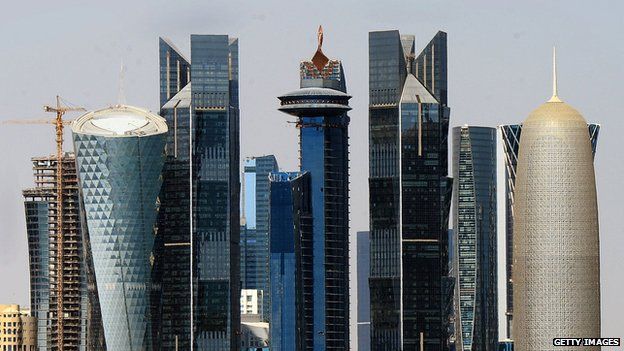Doha climate talks: Will 'hot air' derail the process?
- Published

The right of some rich countries to keep using "hot air" carbon permits could hamper progress at UN climate talks starting on Monday in Qatar.
With the Kyoto Protocol running out at the end of the year, several countries want to carry over unused carbon allowances.
Campaigners say this "hot air" could render new carbon cuts meaningless.
And there are fears that old fault lines between rich and poor will prevent any significant developments.
More than 17,000 participants are expected in the Qatari capital Doha for the 18th Conference of the Parties (COP18) of the United Nations Framework Convention on Climate Change,
Courageous choice
Some surprise has been expressed at the choice of venue. Qatar, rich in oil and particularly gas, has some of the highest per-capita carbon emissions in the world.
But Nick Nuttall, a spokesman for the United Nations Environment Programme (Unep), told BBC News that he praised the "courage" of Qatar in hosting the meeting.
"Some of these countries that we thought in the past were not serious about climate change, were not into renewable energy, are now signalling very strongly that they want to be part of the solution.
"The signals we are getting from the Qatari administration is that they now want to start doing things on climate change and this is maybe their first big step."
Hosting a conference is one thing. Making progress is another.
This year's meeting comes just a month before the expiration of the first commitment period of the Kyoto Protocol, the world's most significant global agreement on reducing emissions of carbon dioxide.
Last year in South Africa, negotiators agreed what is called the Durban Platform. The nub of this was a trade off - the richer countries would extend their carbon cutting beyond 2013 via an extension of the Kyoto Protocol. In return, the developing nations would negotiate a new deal by 2015 that would commit all countries, including emerging super-powers like India and China, to reduce emissions from 2020.
Key to that small forward step was a "coalition of the willing" - an unlikely alliance of the European Union, small island states and the least developed countries.
'Difficult issue'
But in Doha, some of the fine details of an agreement have to be worked out. And these are proving very troublesome for that group in particular.
One of the concerns is over "hot air" - several EU countries were given huge allowances of carbon permits that they want to carry over into a new commitment period. But the scale of the surplus, some 13 billion tonnes of carbon dioxide, could render future promises to cut carbon effectively meaningless.
"Many (delegates) are unhappy about the carry-over," said Dr Quamrul Chowdhury, a negotiator from Bangladesh who speaks for the developing countries group. "It could be a difficult issue."
Tracy Carty, a climate change policy adviser from Oxfam agrees that the issue of surplus carbon permits could be very important in the negotiations.
"Clearly for the second commitment to have integrity, there need to be limits on what's carried over and how much countries use that 'hot air' in their targets," she told BBC News.
"Otherwise we aren't going to get the emissions reductions that we need."
Another critical element is money. During the COP15 talks in Copenhagen in 2009, richer countries agreed to provide $30bn in fast-start finance for the period up to 2012. They also established a Green Climate Fund to control up $100bn per year expected to be raised by 2020 to help poorer countries mitigate the effects of climate change.
Empty fund
But several countries including the UK, France and Germany have been accused of reclassifying money that was already committed as development aid. According to research carried out by Oxfam, only 33% of this climate finance can be considered as new.
And with no money in the climate fund after the end of this year, Oxfam believes it is the most critical issue at this meeting.
Tracy Carty argues the dispute could hamper the new alliances that have led to progress at previous meetings in Cancun and Durban.
"On the broad elements of 2015, we aren't going to see any 'big-bang' moments in Doha like we saw in Durban. But on finance it is a crossroads - this is a period where we are coming to the end of a tranche of money and we don't know what's on the table for next year," she said.
Some, though, remain hopeful that Doha can see a "big-bang" moment, pointing to the fact that the new leadership in China and the re-elected President Obama are both making optimistic noises about climate.
"President Obama indicated that he would make some progress on global warming," said Dr Chowdhury, "and the new leadership of China might go for a deal - that is my personal point of view but we want to see that progress."
- Published21 November 2012
- Published23 August 2012
- Published3 December 2009